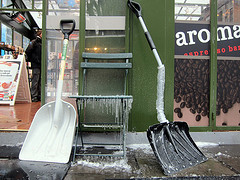Lack Of Snow In 2012 Was A Financial Windfall For Some

(Scoboco)
All that snow that failed to fall during the winter of 2012 didn’t just save you from straining your back while shoveling. It also helped cash-strapped state and local governments save millions of dollars that would normally have been spent plowing and salting.
According to the Wall Street Journal, cities from Boston to Sioux Falls, SD, only spent a fraction — often less than half — of the money they had budgeted for snow and ice removal in 2012.
This means that not only is there excess money in the coffers, but there are still mounds of rock salt and other items that can be used next year. So even if the Winter of 2013 is worse than usual, these municipalities will (hopefully) have what they need to handle it.
It also means that cities and states won’t be doing as much repair work on the roads and highways that normally take a beating during the winter months.
From WSJ.com:
Ohio spent about half as much on plowing and other storm costs than the winter before. Milwaukee came in about $2 million under its $8 million budget. New York City, which had its second-warmest winter on record, saved close to $12 million of its $42.8 million snow account.
Not everyone will be able to roll these savings forward to next year, as some places are still trying to dig themselves out from the debt blizzard left over by huge snowstorms in 2011.
And the lower-than-usual snowfalls are a double-edged sword for those locales that depend on ski money. One the one hand, it means increased snow-making — or days of lost revenue from when it was too warm to make snow; one the other hand, some of that lost tax revenue was offset by savings on plowing and salting costs.
Then there are the people and businesses whose survival depends on at least some snow sticking to the ground. They obviously took a hit this winter as most of us reveled in not having to commute to work on ice-slicked streets and sidewalks.
The city of Burlington, VT, saw the unseasonably warm weather as a chance to get a jump on work that would normally not have begun until the spring.
“We ended up doing outside work that we would almost never be able to do in a normal winter,” the city’s Director of Public Works tells the Journal.
So here’s hoping that the winter of 2013 behaves sensibly and snows just enough to keep people skiing and occasionally plowing and shoveling — but only on the weekends, please.
Less White Equals More Green [WSJ.com]
Want more consumer news? Visit our parent organization, Consumer Reports, for the latest on scams, recalls, and other consumer issues.

